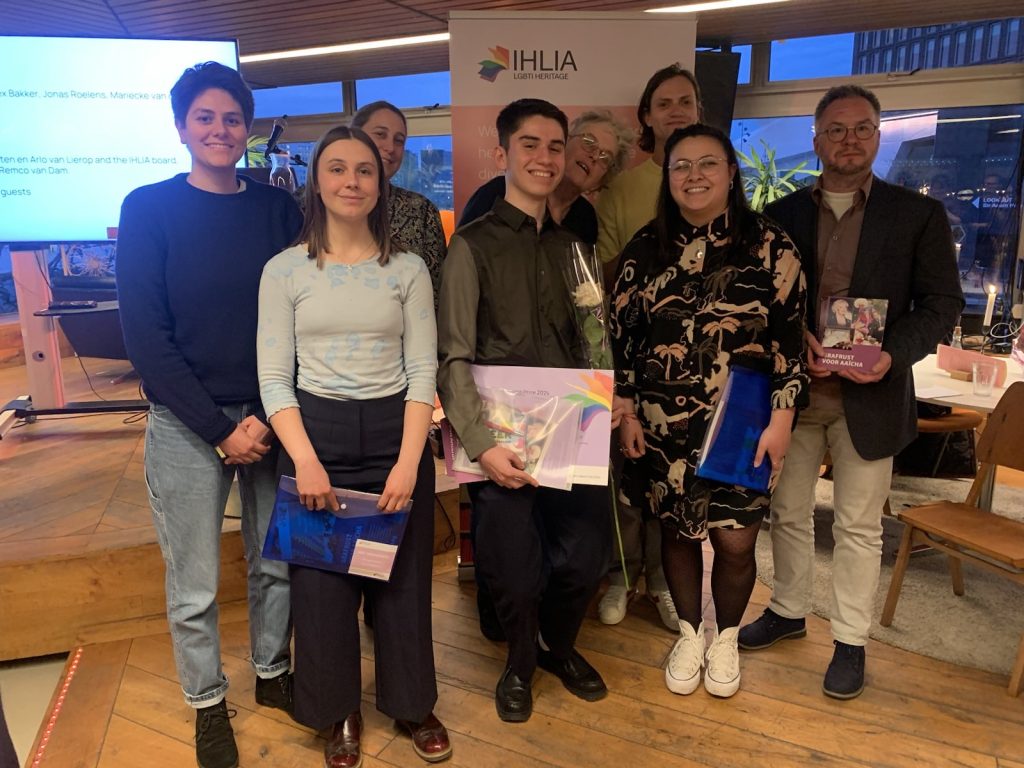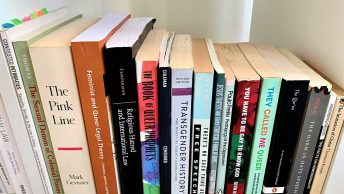
Last Thursday, in a celebration at the Tolhuistuin, in Amsterdam, Diego Galdo González was awarded the IHLIA Thesis Prize. Titled Descendants of Sodom: A History of Pleasure in Lima (1950-1982), Galdo González (University of Amsterdam) wrote a thesis on the history of a group in Peru known as Maricones (fairies).
The jury, chaired by Geertje Mak, chose this thesis because it combines a high theoretical level, wonderful interviews and playful ease of writing.
Image: All judges and nominees. Diego Galdo González is third from left.
The jury about Descendants of Sodom: A History of Pleasure in Lima (1950-1982)
The author took us to the city of Lima, Peru, and took us through oral history into the history of a group known as Maricones. The author chooses as a theoretical and practical starting point the question of how Maricones sought erotic pleasure. Guided by that question, Galdo González leads us through Lima, using stories, celebrations, and events that his respondents fondly recount. This reveals a shift in which Maricone culture moves from street to bar. Moreover, alongside an lhbti identity emerges a rights discourse to which Maricones hardly feel related.
The jurors all read the thesis with breathless admiration, because of the depth of the whole story, the courage to put real lust on paper for once, the broad reading and the ability to make it their own, and last but not least, the history and world of Maricones that the author has brought to life.
About the IHLIA Thesis Prize
Every year, dozens of students at universities write a thesis on a subject in the field of LGBTQI+ history. Unfortunately, much of this material disappears into the proverbial drawer. That is a pity, of course. To make this research more visible and to reward it, IHLIA presents a biannual thesis prize for the best LGBTQI+ historical thesis in Flanders and the Netherlands.
A four-member expert jury – consisting of Mariecke van den Berg, Alex Bakker, Jonas Roelens and Geertje Mak (chair) – evaluated 17 submissions this edition for quality and originality. They read thorough, innovative, very comprehensive, refreshing and in-depth academic studies. The diversity of topics was also great.
In the end, the jury decided to nominate four theses for the prize. These were the remaining three:
- Grensverleggende zorg: Ervaringen van Vlaamse transgender personen met medische zorg, 1950 tot heden. – Esther Lamberts (KU Leuven)
- The Impact of LG(BT) Activists with Religious Affinity on LG(BT) Emancipation and Religion in the Netherlands (1978-2001).– Leonie Paauwe (Utrecht University)
- Van crimen nefandum naar homosexualiteit: het publieke debat over homoseksualiteit in Nederland tussen 1911 en 1940. – Aimée Tio (Leiden University)







